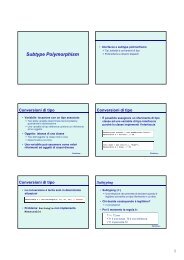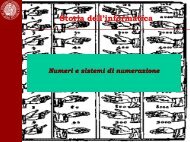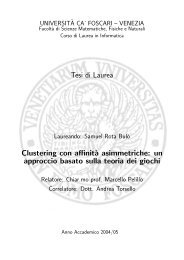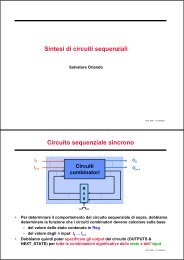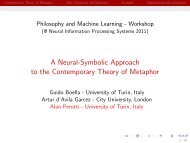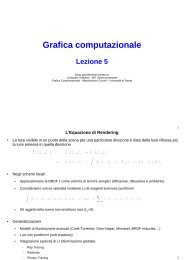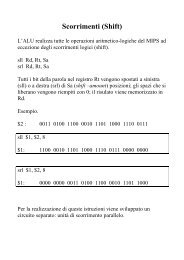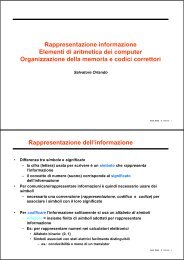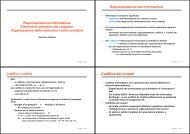Foscari - Dipartimento di Scienze Ambientali, Informatica e Statistica
Foscari - Dipartimento di Scienze Ambientali, Informatica e Statistica
Foscari - Dipartimento di Scienze Ambientali, Informatica e Statistica
Create successful ePaper yourself
Turn your PDF publications into a flip-book with our unique Google optimized e-Paper software.
There is not much good news in the newspapers but occasionally something happens that can make<br />
even the most pessimistic person think that one day the world could be a better pLace.<br />
Most people have probably missed what’s happened because it is a “good news” story, so the headlines<br />
were small. But the consequences could be large. It could help save the lives of millions in the poor<br />
countries of Africa and in other parts of the world, who are under the death sentence of HIV infection.<br />
Me<strong>di</strong>cines could keep them alive, but although those me<strong>di</strong>cines have become much cheaper, they are<br />
still not cheap enough for someone who can hardly feed his or her family.<br />
One thing that is preventing really low prices is the patent system. When they develop a new drug, the<br />
giant pharmaceutical companies get 20 years protection, which means they can recover their costs<br />
through high prices and large profits. This is normal in the wealthy northern hemisphere but <strong>di</strong>sastrous<br />
in the poor south.<br />
For years the pharmaceutical companies and the governments of countries such as Britain and the<br />
United States have insisted that the patent system is essential for the industry. They say that without the<br />
patents there would be no money to research and develop new drugs. But last month a commission<br />
presented a report which states very c1early that patents can be bad for poor countries.<br />
This report is remarkable for a number of reasons. On the commission on intellectual property rights<br />
there were lawyers, scientists and a bio-ethicist, but also a senior <strong>di</strong>rector from the drug company<br />
Pfizer. This suggests that the ra<strong>di</strong>cal solutions in the report would not do such serious harm to the<br />
pharmaceuticals industry. Perhaps patents actually prevent innovation even in the developed world.<br />
Sometimes they stop scientists exploring promising areas of research. Sometimes they Force<br />
companies to fight in court and this can waste millions of dollars. And patents do not, and will not,<br />
persuade the drug companies to invent new me<strong>di</strong>cines for <strong>di</strong>seases of poor people. The report says the<br />
only way to do that is to spend public money.<br />
At the centre of the patent question is the trade and intellectual property rights agreement of the World<br />
Trade Organisation. This agreement is due to be signed by the poorest countries by 2006.<br />
The result of this will be to introduce to the poor southern nations a patent system which is designed to<br />
protect technologies and drugs in rich countries. The report says that poorer countries should be<br />
allowed to set their own levels of intellectual property protection. Most important of all, the report says<br />
that countries with serious <strong>di</strong>seases like AIDS, malaria and tuberculosis must be able to bypass patents.<br />
They should be able to make cheap generic versions of patented drugs themselves, and they should be<br />
able buy generics made abroad if they cannot make them at home. The commission does not want to<br />
cause damage to the pharmaceutical industry. It says that patents are important and must be respected<br />
in wealthy countries.<br />
Of course, the pharmaceuticals industry does not agree. “Patents are essential so that we can develop<br />
new me<strong>di</strong>cines to fight <strong>di</strong>sease in both the developed and developing world,” responded a spokesman.<br />
The industry is probably putting pressure on politicians at this very moment. But the existence of this<br />
report suggests that there may have been a change of <strong>di</strong>rection within government which will put<br />
people before the needs of the pharmaceuticals companies.<br />
Comprehension check<br />
Match the beginnings and en<strong>di</strong>ngs of the sentences.<br />
1. The news about the patent report only made small headlines because ....<br />
2. Many people will <strong>di</strong>e of AIDS in Africa and in other parts of the world because<br />
3. The governments of rich countries defend the patents system because ....<br />
4. Patents may prevent innovation because .<br />
5. Patents are bad for poor countries because .<br />
6. The TRIPS agreement will be bad for poor countries because ....<br />
7. The report says countries with serious <strong>di</strong>seases<br />
8. If poor countries cannot produce generic drugs themselves they ....<br />
13




